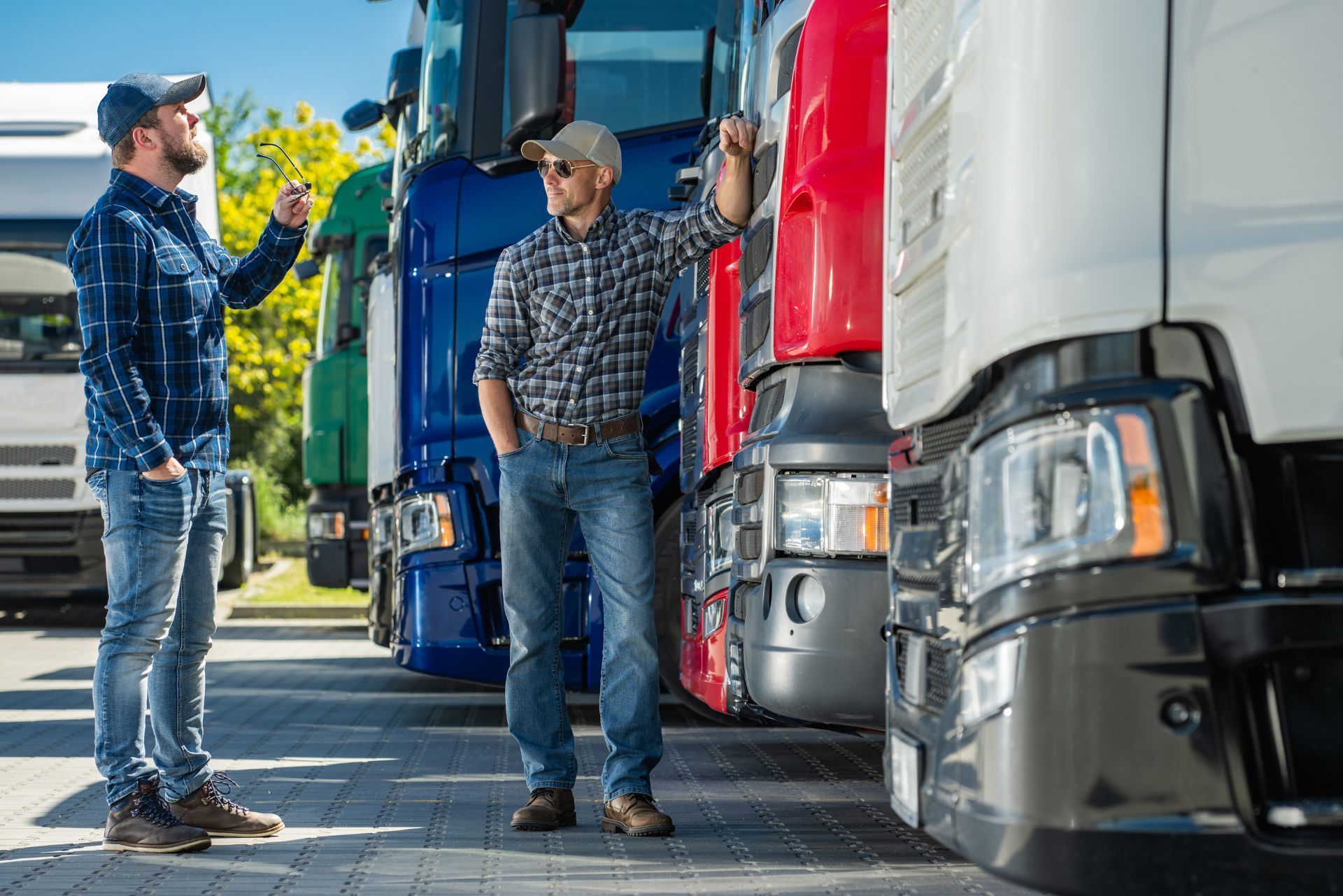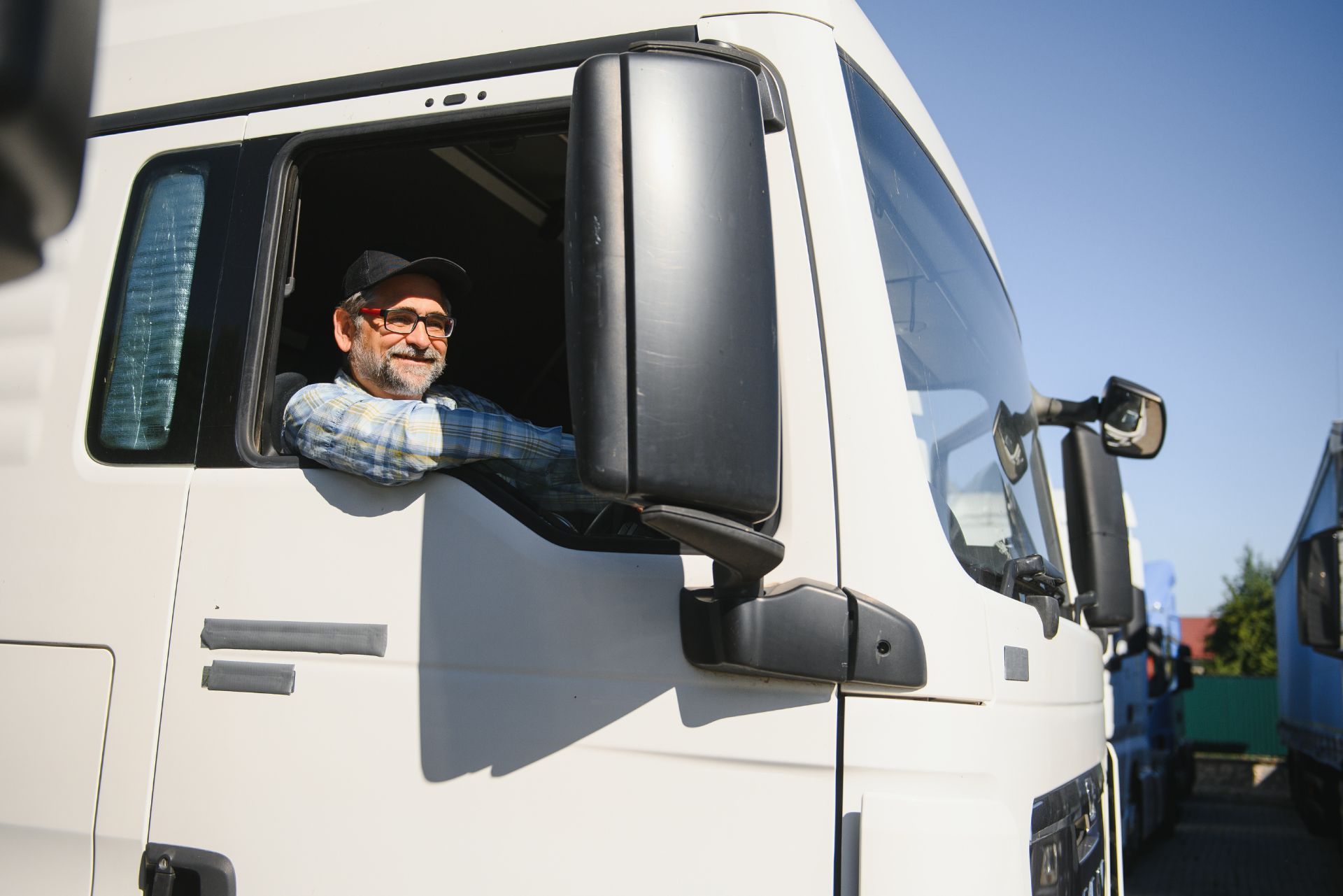Minnesota Commercial Trucking Insurance

See How We're Different
or call us: (763) 242-1668
Common Business Insurance Policies
By: Matt Larsen
Owner of Capstone Insurance Group & HVAC Contractor Insurance Advisor
763-242-1668
Index
Understanding Commercial Trucking Insurance in Minnesota
Legal Requirements for Commercial Trucking Insurance in Minnesota
Types of Commercial Trucking Insurance Coverage
Factors Affecting the Cost of Commercial Trucking Insurance in Minnesota
How to Choose the Right Commercial Trucking Insurance in Minnesota
Common Challenges and How to Overcome Them
The Importance of Insurance for Minnesota Trucking Businesses
Contact Us
Phone
Location
Operating a commercial trucking business in Minnesota comes with a unique set of challenges and responsibilities. One of the most critical aspects of managing such a business is securing the right commercial trucking insurance. This coverage not only protects your assets and employees but also ensures compliance with state and federal regulations. In this comprehensive guide, you’ll learn everything you need to know about Minnesota commercial trucking insurance—from the types of coverage available to legal requirements, cost factors, and tips for choosing the best policy for your business.
Understanding Commercial Trucking Insurance in Minnesota
Commercial trucking insurance is a specialized form of coverage designed to protect trucking companies, owner-operators, and drivers from financial losses resulting from accidents, cargo damage, liability claims, and other risks associated with commercial trucking operations. In Minnesota, as in other states, trucking insurance requirements are influenced by both state laws and federal regulations enforced by the Federal Motor Carrier Safety Administration (FMCSA).
Given the high-risk nature of the trucking industry—where accidents can lead to significant property damage, bodily injury, and even fatalities—having comprehensive insurance coverage is not just a legal obligation but a vital business safeguard. The financial implications of a serious accident can be devastating, often exceeding the limits of basic coverage. Thus, many operators choose to enhance their policies with additional coverage options, such as cargo insurance, which protects the goods being transported, and physical damage coverage, which safeguards the truck itself from accidents, theft, or vandalism.
Who Needs Commercial Trucking Insurance?
Any individual or business operating a commercial truck in Minnesota must have appropriate insurance coverage. This includes:
- Owner-operators who own and drive their trucks
- Trucking companies with multiple drivers and vehicles
- Freight carriers and logistics companies
- Businesses that use commercial trucks for deliveries or hauling goods
Even if you operate a single truck, Minnesota law requires you to carry minimum liability insurance. For larger fleets and interstate operations, additional coverage and higher limits are mandated. It's also important to note that the type of cargo being transported can influence insurance needs; for example, hazardous materials require specialized coverage due to the increased risk involved. Furthermore, many insurers offer customized policies that can be tailored to the unique needs of a business, ensuring that all potential risks are adequately covered. This flexibility allows trucking companies to find solutions that align with their operational requirements, ultimately contributing to a more secure and sustainable business model.

Legal Requirements for Commercial Trucking Insurance in Minnesota
Compliance with insurance requirements is essential to avoid penalties, fines, or even suspension of your commercial trucking operations. Minnesota follows federal guidelines set by the FMCSA, which establishes minimum insurance coverage based on the type of cargo, vehicle weight, and operational scope. Understanding these requirements is crucial for any trucking business operating within the state, as they not only protect the business but also ensure the safety of the public and the integrity of the transportation system.
Minimum Liability Insurance Limits
The FMCSA mandates minimum liability insurance coverage for commercial trucks, which Minnesota enforces rigorously. The minimum coverage amounts vary depending on the type of cargo transported:
- General freight: $750,000 minimum liability coverage
- Oil transport: $1,000,000 minimum liability coverage
- Hazardous materials: $5,000,000 minimum liability coverage
These minimums apply to trucks operating interstate or intrastate. However, many Minnesota trucking companies opt for higher coverage limits to better protect their assets and business reputation. This proactive approach not only safeguards against potential lawsuits but also enhances the company's credibility with clients and partners, as higher coverage limits can be indicative of a responsible and well-managed operation.
Additional State Requirements
Besides federal mandates, Minnesota requires commercial trucking operators to carry:
- Worker’s Compensation Insurance: For employees injured on the job, Minnesota law requires trucking companies to provide worker’s compensation coverage.
- Uninsured Motorist Coverage: This protects your business if your truck is involved in an accident with an uninsured or underinsured driver.
- Trailer Interchange Coverage: If you use trailers owned by other companies, this coverage protects against damage or loss during interchange.
Failure to meet these requirements can lead to severe penalties, including fines, loss of operating authority, and legal liabilities. Moreover, the implications of not having adequate insurance can extend beyond financial penalties; they can also jeopardize the safety of your drivers and the general public. In a state like Minnesota, where winter weather can create hazardous driving conditions, having robust insurance coverage is not just a legal obligation but a critical component of operational safety and risk management. Additionally, trucking companies are encouraged to regularly review their insurance policies to adapt to changing regulations and operational needs, ensuring they remain compliant and adequately protected in a dynamic industry.
Types of Commercial Trucking Insurance Coverage
Commercial trucking insurance is not a one-size-fits-all product. Understanding the different types of coverage available helps Minnesota trucking businesses tailor their policies to their specific risks and operational needs.
1. Primary Liability Insurance
This is the foundational coverage required by law. It covers bodily injury and property damage caused by your truck to others in an accident. For example, if your truck causes a collision that injures another driver or damages their vehicle, primary liability insurance pays for those damages up to your policy limits. It is important to note that the minimum coverage limits can vary by state, and many trucking companies opt for higher limits to ensure adequate protection against potential lawsuits and claims.
2. Physical Damage Insurance
This coverage protects your truck and trailer from damage due to collisions, theft, vandalism, fire, or natural disasters. It typically includes:
- Collision Coverage: Pays for repairs or replacement if your truck is damaged in an accident.
- Comprehensive Coverage: Covers non-collision events like theft, fire, or weather-related damage.
Physical damage insurance is especially important for owner-operators who rely on their trucks to generate income daily. The costs of repairs can be substantial, and without this coverage, a single incident could jeopardize a trucking business's financial stability. Additionally, many lenders require physical damage insurance if you are financing your truck, making it a critical component of your overall insurance strategy.
3. Cargo Insurance
Cargo insurance protects the goods you are transporting. If the cargo is lost, damaged, or stolen during transit, this coverage reimburses you or your client for the value of the goods. Minnesota trucking companies that haul valuable or fragile items should consider robust cargo insurance. Different policies can be tailored to the type of cargo being transported, with specialized coverage options available for high-value items, perishables, or hazardous materials. Understanding the specific risks associated with the cargo you transport can help you choose the right level of coverage.
4. Bobtail Insurance
Bobtail insurance covers your truck when it is being operated without a trailer attached, such as when traveling to pick up a load or returning empty. This coverage is essential for owner-operators who drive their trucks independently. It provides peace of mind, ensuring that you are protected even during those times when you are not actively transporting goods. Many trucking companies may overlook this coverage, but it can be a crucial safeguard against unexpected liabilities that arise when the truck is not in transit with a load.
5. Motor Truck General Liability Insurance
This coverage protects against liability claims not related to vehicle operation, such as damage to property at a loading dock or bodily injury caused by your business operations. It is particularly vital for trucking companies that engage in loading and unloading activities, as these operations can pose unique risks. Additionally, this insurance can cover legal fees and settlements resulting from claims, which can be significant, depending on the circumstances of the incident.
6. Workers’ Compensation Insurance
Required by Minnesota law, this insurance covers medical expenses and lost wages for employees injured on the job. Trucking companies with drivers or other staff must carry workers’ compensation insurance to comply with state regulations. This coverage not only protects your employees but also shields your business from potential lawsuits related to workplace injuries. Investing in a comprehensive workers’ compensation policy can also improve employee morale and retention, as it demonstrates a commitment to their safety and well-being.
7. Trailer Interchange Insurance
If your trucking operation involves using trailers owned by others, trailer interchange insurance covers physical damage to those trailers while in your possession. This type of insurance is particularly relevant for businesses that frequently engage in freight exchanges with other carriers. By ensuring that you have the right coverage in place, you can avoid potential disputes and financial liabilities that may arise from accidental damage to a trailer that is not yours. Understanding the terms of the interchange agreement is crucial, as it often outlines the responsibilities and liabilities of each party involved.
Factors Affecting the Cost of Commercial Trucking Insurance in Minnesota
Insurance premiums for commercial trucking vary widely based on several factors. Understanding these can help businesses manage costs while maintaining adequate coverage.
1. Type of Cargo
Transporting hazardous materials or high-value goods increases insurance risk and premiums. For example, hauling flammable liquids or chemicals requires specialized endorsements and higher coverage limits, leading to higher costs. Additionally, the nature of the cargo can affect liability exposure; for instance, transporting perishable goods may necessitate specific temperature controls, which can complicate logistics and increase the risk of loss.
2. Vehicle Type and Age
Newer trucks with advanced safety features may qualify for lower premiums, while older trucks with higher maintenance risks can increase costs. The size and weight of the truck also influence rates. Larger vehicles often have higher repair costs and can cause more significant damage in accidents, which insurers take into account when calculating premiums. Furthermore, the make and model of the truck can play a role; certain brands are known for their reliability and lower accident rates, potentially leading to more favorable insurance terms.
3. Driving History and Experience
Insurers evaluate the driving records of all drivers in the fleet. A history of accidents or violations can significantly increase premiums. Conversely, experienced drivers with clean records help lower costs. Additionally, the training and certifications that drivers possess can also impact rates; for example, drivers who have completed advanced safety training or have specialized endorsements may be viewed as lower risk, thus qualifying for discounts.
4. Coverage Limits and Deductibles
Higher coverage limits provide more protection but come with higher premiums. Choosing appropriate deductibles can also affect the cost; higher deductibles generally lower premiums but increase out-of-pocket expenses in the event of a claim. Businesses must carefully weigh their risk tolerance and financial capability when selecting these options, as an inadequate coverage limit could lead to significant financial strain in the event of a major incident.
5. Operational Area
Operating primarily in urban areas with heavy traffic or regions prone to severe weather can increase risk and insurance costs. Minnesota’s harsh winters and icy roads are factors insurers consider. Additionally, routes that involve frequent stops or deliveries can elevate the likelihood of accidents, which is another critical aspect that underwriters analyze when determining premiums. Companies that operate in remote areas may face different challenges, such as longer response times for assistance in case of breakdowns, which can also influence their insurance rates.
6. Safety and Compliance Programs
Implementing rigorous safety training, vehicle maintenance, and compliance with FMCSA regulations can reduce risk and lead to premium discounts. Insurers often look favorably on fleets that maintain comprehensive safety records and demonstrate a commitment to ongoing driver education. Furthermore, utilizing technology such as telematics can provide real-time data on driving behaviors, enabling companies to identify areas for improvement and potentially lower their insurance costs by demonstrating proactive risk management practices.

How to Choose the Right Commercial Trucking Insurance in Minnesota
Selecting the right insurance policy requires careful consideration of your business’s unique needs, risks, and budget. Here are some tips to guide the process:
Assess Your Business Risks
Start by evaluating the types of cargo you haul, the routes you travel, and the size of your fleet. Identify potential risks such as hazardous materials transportation or frequent interstate travel that may require specialized coverage.
Compare Multiple Insurance Providers
Not all insurers offer the same coverage options or pricing. Request quotes from multiple companies and compare their policies, customer service reputation, and claims handling process.
Work with a Commercial Trucking Insurance Specialist
Insurance agents who specialize in commercial trucking understand the industry’s complexities and can help tailor a policy that meets Minnesota’s legal requirements while fitting your budget.
Consider Bundling Coverage
Many insurers offer discounts if you bundle multiple coverages, such as liability, physical damage, and cargo insurance. Bundling can simplify management and reduce overall costs.
Review and Update Your Policy Regularly
As your business grows or changes, your insurance needs may evolve. Regularly review your policy to ensure adequate coverage and adjust limits or endorsements as necessary.
Common Challenges and How to Overcome Them
Running a commercial trucking business in Minnesota involves navigating various challenges related to insurance. Understanding these can help you proactively manage risks and avoid costly pitfalls.
High Insurance Premiums
Premiums for commercial trucking insurance can be expensive, especially for small operators or those hauling high-risk cargo. To mitigate costs:
- Maintain a clean driving record and enforce safety protocols
- Invest in driver training and vehicle maintenance
- Shop around annually for better rates
- Compliance with Changing Regulations
Insurance requirements and trucking regulations can change. Staying informed through resources like the Minnesota Department of Transportation (MnDOT) and FMCSA websites is crucial to remain compliant and avoid penalties.
Claims Handling and Disputes
In the event of an accident, timely and accurate claims filing is essential. Working with an insurer known for responsive claims service can reduce downtime and financial impact.
The Importance of Insurance for Minnesota Trucking Businesses
Insurance is more than just a legal requirement—it is a vital tool for protecting your business’s financial health. In Minnesota, where trucking plays a significant role in the economy, having the right insurance ensures you can recover quickly from accidents, protect your employees, and maintain your reputation with clients and partners.
According to the Minnesota Trucking Association, the state’s trucking industry supports over 140,000 jobs and moves billions of dollars worth of goods annually. With such a critical role, commercial trucking insurance safeguards the backbone of Minnesota’s supply chain.
Conclusion
Commercial trucking insurance in Minnesota is a complex but essential aspect of operating a successful trucking business. Understanding the types of coverage, legal requirements, cost factors, and best practices for selecting a policy will help you protect your assets, comply with regulations, and maintain smooth operations.
Whether you are an owner-operator or manage a large fleet, investing time and resources into securing the right insurance coverage is a smart business decision that pays off in the long run.
For the most accurate and personalized advice, consult with a licensed commercial trucking insurance agent familiar with Minnesota’s specific requirements and industry standards.





